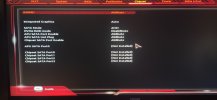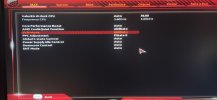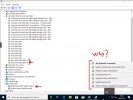Hi everyone, I'm new to proxmox. I am trying to passthrough the motherboard integrated sound card to a Windows 10 VM for my 5.1 amplifier.
System run on:
I am trying in parallel to passthrough the IGPU of the Ryzen 3 (Vega 8) at the same VM and it behaves in the same way.
For now I have always tried to passthrough either the IGPU or the sound card, never together (even if that is the final goal). In addition, the VM starts correctly if I don't passthrough anything. I also tried with a UEFI BIOS system in VM configuration, nothing changes.
I lost 2 days without coming to a solution, I don't know what to do anymore. Hope someone can help me find a solution, thanks a lot in advance.
Here are some useful dumps to understand why nothing works and if I made a mistake in the configuration
Kernel modules:
Dump command: dmesg | grep -e DMAR -e IOMMU -e AMD-Vi
IOMMU groups:
In alternative more detailed dump PCIe devices (running lspci -v command) in the attached txt file
Thank you so much again!!
System run on:
- Amd Ryzen 3 2200G
- GIGABYTE B450M DS3H (latest BIOS update F60h)
- 8GB RAM DDR4
I am trying in parallel to passthrough the IGPU of the Ryzen 3 (Vega 8) at the same VM and it behaves in the same way.
For now I have always tried to passthrough either the IGPU or the sound card, never together (even if that is the final goal). In addition, the VM starts correctly if I don't passthrough anything. I also tried with a UEFI BIOS system in VM configuration, nothing changes.
I lost 2 days without coming to a solution, I don't know what to do anymore. Hope someone can help me find a solution, thanks a lot in advance.
Here are some useful dumps to understand why nothing works and if I made a mistake in the configuration
Windows 10 VM configuration
Code:
agent: 1
args: -cpu 'host,+kvm_pv_unhalt,+kvm_pv_eoi,hv_vendor_id=NV43FIX,kvm=off'
balloon: 0
boot: order=scsi0;ide2;net0
cores: 1
cpu: host,hidden=1,flags=+pcid
ide2: local:iso/virtio-win-0.1.190.iso,media=cdrom,size=489986K
machine: q35
memory: 2048
name: Windows
net0: virtio=7E:57:F6:D3:44:1B,bridge=vmbr0,firewall=1
numa: 1
ostype: win10
scsi0: local-lvm:vm-101-disk-0,size=40G
scsihw: virtio-scsi-pci
smbios1: uuid=24857be2-d336-4eff-bb34-0dbd875af7b2
sockets: 1
startup: order=2
vga: std
vmgenid: c680e2ec-5c53-4cdd-97a0-7d3b4b9ba188
[As mentioned before, only one of the two devices, never together]
hostpci0: 08:00.6,rombar=0 [sound card]
hostpci1: 08:00.0;08:00.1,pcie=1,rombar=0 [IGPU + HDMI audio]Same cat of commands executed following the PCIe passthrough guides
Dump grub file (commented lines removed in this dump, not in the file):
Code:
GRUB_DEFAULT=0
GRUB_TIMEOUT=5
GRUB_DISTRIBUTOR="Proxmox Virtual Environment"
GRUB_CMDLINE_LINUX_DEFAULT="quiet intel_iommu=on iommu=pt pcie_acs_override=downstream,multifunction vfio-pci.ids=1002:15d8,1002:15de,1022:15e3 nofb nomodeset video=vesafb:off,efifb:off"
GRUB_CMDLINE_LINUX=""
GRUB_DISABLE_OS_PROBER=true
GRUB_DISABLE_RECOVERY="true"Kernel modules:
Code:
root@pve:~# cat /etc/modules
# /etc/modules: kernel modules to load at boot time.
#
# This file contains the names of kernel modules that should be loaded
# at boot time, one per line. Lines beginning with "#" are ignored.
vfio
vfio_iommu_type1
vfio_pci
vfio_virqfdDump command: dmesg | grep -e DMAR -e IOMMU -e AMD-Vi
Code:
[ 0.000000] Warning: PCIe ACS overrides enabled; This may allow non-IOMMU protected peer-to-peer DMA
[ 0.026213] DMAR: IOMMU enabled
[ 0.876817] pci 0000:00:00.2: AMD-Vi: Unable to read/write to IOMMU perf counter.
[ 0.878333] pci 0000:00:00.2: AMD-Vi: Found IOMMU cap 0x40
[ 0.878333] pci 0000:00:00.2: AMD-Vi: Extended features (0x4f77ef22294ada):
[ 0.878336] AMD-Vi: Interrupt remapping enabled
[ 0.878336] AMD-Vi: Virtual APIC enabled
[ 0.878498] AMD-Vi: Lazy IO/TLB flushing enabled
Code:
root@pve:~# cat /etc/modprobe.d/vfio.conf
options vfio-pci ids=1022:15e3 [Audio card mobo]
options vfio-pci ids=1002:15d8,1002:15de disable-vga=1 [AMD IGPU + HDMI Audio]IOMMU groups:
Code:
root@pve:~# find /sys/kernel/iommu_groups/ -type l
/sys/kernel/iommu_groups/17/devices/0000:06:00.0
/sys/kernel/iommu_groups/7/devices/0000:00:14.3
/sys/kernel/iommu_groups/7/devices/0000:00:14.0
/sys/kernel/iommu_groups/25/devices/0000:08:00.6
/sys/kernel/iommu_groups/15/devices/0000:03:04.0
/sys/kernel/iommu_groups/5/devices/0000:00:08.1
/sys/kernel/iommu_groups/23/devices/0000:08:00.3
/sys/kernel/iommu_groups/13/devices/0000:03:00.0
/sys/kernel/iommu_groups/3/devices/0000:00:01.3
/sys/kernel/iommu_groups/21/devices/0000:08:00.1
/sys/kernel/iommu_groups/11/devices/0000:02:00.1
/sys/kernel/iommu_groups/1/devices/0000:00:01.1
/sys/kernel/iommu_groups/18/devices/0000:06:00.1
/sys/kernel/iommu_groups/8/devices/0000:00:18.3
/sys/kernel/iommu_groups/8/devices/0000:00:18.1
/sys/kernel/iommu_groups/8/devices/0000:00:18.6
/sys/kernel/iommu_groups/8/devices/0000:00:18.4
/sys/kernel/iommu_groups/8/devices/0000:00:18.2
/sys/kernel/iommu_groups/8/devices/0000:00:18.0
/sys/kernel/iommu_groups/8/devices/0000:00:18.7
/sys/kernel/iommu_groups/8/devices/0000:00:18.5
/sys/kernel/iommu_groups/26/devices/0000:09:00.0
/sys/kernel/iommu_groups/16/devices/0000:05:00.0
/sys/kernel/iommu_groups/6/devices/0000:00:08.2
/sys/kernel/iommu_groups/24/devices/0000:08:00.4
/sys/kernel/iommu_groups/14/devices/0000:03:01.0
/sys/kernel/iommu_groups/4/devices/0000:00:08.0
/sys/kernel/iommu_groups/22/devices/0000:08:00.2
/sys/kernel/iommu_groups/12/devices/0000:02:00.2
/sys/kernel/iommu_groups/2/devices/0000:00:01.2
/sys/kernel/iommu_groups/20/devices/0000:08:00.0
/sys/kernel/iommu_groups/10/devices/0000:02:00.0
/sys/kernel/iommu_groups/0/devices/0000:00:01.0
/sys/kernel/iommu_groups/19/devices/0000:07:00.0
/sys/kernel/iommu_groups/9/devices/0000:01:00.0In alternative more detailed dump PCIe devices (running lspci -v command) in the attached txt file
Thank you so much again!!
Attachments
Last edited:





